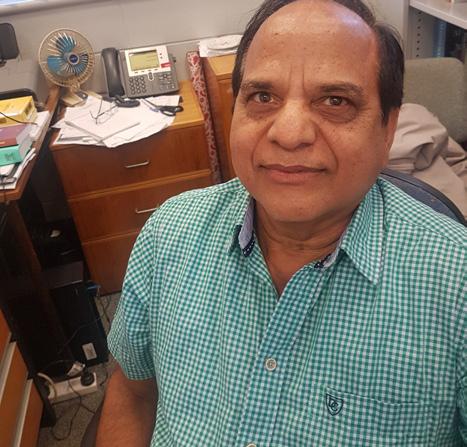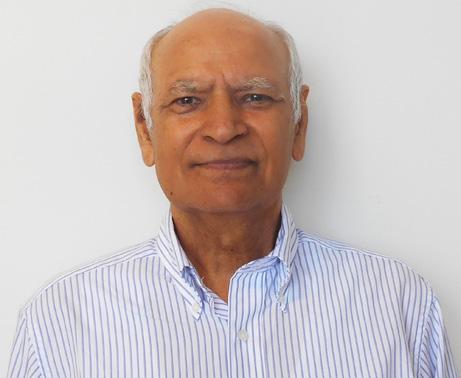
4 minute read
HONOURS HARNESSING THE POWER OF THE SUN
from 2018-07 Perth
by Indian Link
DARWIN Prof. Jai Singh AM
For significant service to education, particularly in the field of physics, as an academic and researcher, and to professional scientific organisations
Dr Jai Singh’s primary area of research over the last decade at Charles Darwin University’s School of Engineering and Information Technology has been solar cells, both organic and inorganic. This includes thin-film amorphous silicon solar cells and organic solar cells (OSC) for optimal photovoltaic performance.
“So far, solar cells have been made from silicon and therefore are quite expensive to produce,” the professor of physics explained. “The organic cells are cheaper, flexible and lightweight, with a simpler fabrication process compared to inorganic ones.”
However, OSCs have poor power conversion efficiencies, with a current efficiency of around 12% relative to the conventional silicon solar cells, which is 25%. Another concern with organic materials is stability, as they can decompose under strong light, Prof Singh further indicated.
His focus area therefore has been optimising the performance of OSCs by exploring new materials such as polymerfullerene and improving cell design.
“It’s all about enabling the OSCs to absorb more light by optimising their layer thicknesses and hence enhancing their power conversion efficiency.”
What people don’t realise is that unlike resources that are extracted from the earth, solar power doesn’t get depleted and available all the year round. “But we need technology to cost-effectively convert this energy and capitalise on its immense potential,” Prof. Singh explained.
The professor is also supervising a number of researchers, who are exploring alternatives in this growth area. “Both in terms of solar research and usage, Australia has a high uptake and is ahead of its peers,” he noted.
Besides research and publications, Prof. Singh has collaborations with several global faculties and is the founder/ organiser of international conferences including those on excitonic processes in condensed matter as well as optical and optoelectronic properties of materials and applications. He has been president of the Northern Territory branch of the
Son Of The Soil
BRISBANE Prof. Ram Chander Dalal AM
For significant service to agriculture through research into land degradation and sustainable farming practices
Soil degradation as an environmental challenge is fast becoming an issue of global concern. Defined as a decline in soil quality caused by human activity, it affects not only food security, but also water filtration, biodiversity (many species live below the earth’s surface) and climate change (soil acts as a carbon storehouse).
Soil and land degradation have been at the centre of Prof. Ram Chander Dalal’s professional life since he arrived
Australian Solar Council since 1998.
For his scientific contributions in the field, Prof. Jai Singh was honoured with the AM by the Australian government.
“The award came as a surprise to me,” Prof. Singh told Indian Link. “Of course, I am deeply honoured and humbled.”
Originally from Cheoraha, a remote agrarian community in Sultanpur district of Uttar Pradesh, Prof. Singh believes that it was motivation, hard work and focus that shaped his professional journey.
“My village had no high school. Back then, I had two choices – either start working on the farm or move to the city,” he reminisced. His maternal uncle’s suggestion to relocate to Lucknow proved to be turning point for the workaholic, in this country in 1975. His work at the School of Agriculture and Food Science at the University of Queensland, Brisbane has created awareness about the issue within the farming, scientific and general community. His research has contributed significantly to restorative practices for sustainable land management that are now in use both here in Australia and overseas.
For his work in an area that is now considered critical, Prof. Dalal was conferred the AM in this year’s Queen’s Birthday Honours.
“It feels wonderful to be recognised for the work done over many years,” Prof. Dalal told Indian Link. “Much of the work has been collaborative though, accomplished with the help of peers and many associates and farmers, so I am grateful to them all.”
He added, “I hope to use this AM honour to promote the work I’ve been doing. We’ve seen results from it across Australia and now also in India, Bangladesh and Nepal.”
Describing his body of work with the Department of Primary Industries, Prof. Dalal explained, “Soil and land management has been my primary area of concern, including the study of soil fertility, soil biology, soil chemistry, soil and water conservation, landscape restoration, soil carbon sequestration, soil constraints including sodicity and salinity, and nitrogen, phosphorus and zinc nutrition. I’ve also been involved with sustainable crop and pasture production systems using rotations, and who topped every exam thereafter, winning scholarships all the way. Maths and physics were his forte. Even before Singh completed his doctorate in theoretical physics from IIT Delhi, he had research offers that took him to Germany, England and eventually Australia.
After a stint at ANU’s School of Chemistry, he moved to Darwin, which has been home for the last three decades. While Singh believes there is a big future in applied physics, his immediate concern is that Darwin is unable to attract physics students at undergraduate level. He has mentored PhD students from around the world and hopes that interest in solar cell development will outlive his tenure.
Usha Ramanujam Arvind
fertiliser, nutrient and water use efficiency. Greenhouse gas mitigation has been another research interest, including the study of emissions and of uptake in soilplant systems.”
The professor’s work here has seen him work closely with farmers, who he describes as exceptionally open and warm, and keen to adopt the practices that he demonstrates. “A great side benefit has been many wonderful farm visits and plenty of farmer friends,” he revealed.
Prof. Dalal arrived in Australia in 1975, with a research position at the University of New England in Armidale NSW, having gained a PhD from the renowned Indian Agricultural Research Institute in New Delhi. He moved to Queensland in 1980.

His work has taken him back to his roots in South Asia, thanks to his collaborations at the Australian Centre for International Agricultural Research. “My work there is about long term food security, using sustainable and resilient farming systems, including what we refer to as intensified farming systems in which we develop two or more crops where one was grown previously,” he detailed.
Prof. Dalal grew up on a farm in Haryana and was drawn to agriculture at a young age. “Very early on, a teacher said to me, ‘Soil is the mother of all resources’. It struck a chord with me. Everything emanates from the soil: it is from soil that we can find solutions for pollution, clean water and clean food.”
Rajni Anand Luthra








